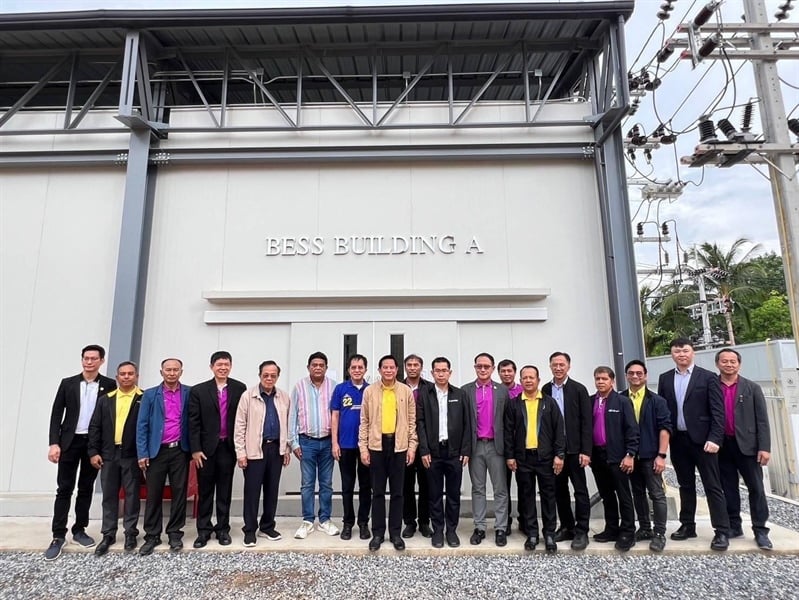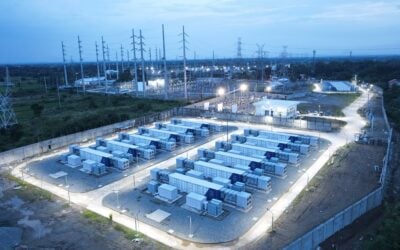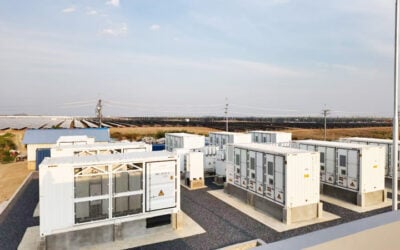
The Provincial Electricity Authority (PEA) of Thailand will assess the feasibility of energy storage business models in partnership with a subsidiary of state-owned oil & gas company PTT Group.
PEA is Thailand’s state enterprise responsible for providing electricity in 74 provinces, covering most of the country excluding major urban centres like Bangkok which fall under the remit of the Metropolitan Electricity Authority (MEA).
Enjoy 12 months of exclusive analysis
- Regular insight and analysis of the industry’s biggest developments
- In-depth interviews with the industry’s leading figures
- Annual digital subscription to the PV Tech Power journal
- Discounts on Solar Media’s portfolio of events, in-person and virtual
Last week (26 June), PEA deputy governor Prasit Chanprasit signed a Memorandum of Understanding (MoU) with representatives of Nuovo Plus, which is a battery business launched by PTT Group.
PEA sits under the governance of the Ministry of the Interior, while PTT Group has the Ministry of Energy as its parent organisation.
Under the terms of the MoU, the pair will jointly study the feasibility of deploying energy storage system (ESS) technology in Thailand and the development of suitable energy storage business models, leveraging each party’s expertise and experience.
PEA noted that energy storage could increase access to clean energy including renewable sources, while helping stabilise the power distribution network and provide continuous and stable economic growth for the country.
Nuovo Plus manufactures products including battery solutions for electric mobility in both passenger and commercial electric vehicles (EVs), UPS for data centres and other applications, as well as energy management system (EMS) technology.
It also makes and markets battery energy storage system (BESS) solutions for commercial and industrial (C&I) and utility-scale segments, as well as providing system integration services to BESS projects.
The PTT Group-owned company is in a manufacturing joint venture (JV) with the Singapore subsidiary of major Chinese battery manufacturer Gotion High-Tech. Called Global Power Synergy Company (GPSC), it launched in late 2022 with a view to establishing a gigawatt-hour scale factory (‘gigafactory’) in Thailand producing battery packs and modules, as reported by Energy-Storage.news at the time.
GPSC’s products include GCELL, a lithium-ion (Li-ion) battery cell featuring the licensed SemiSolid electrode developed by US-headquartered battery materials and manufacturing platform company 24M.
Thailand prepares for renewable energy and peak demand growth
This morning (3 July), the PEA announced that Thailand’s deputy prime minister and energy minister Peerapan Salirathavibhaga had made a visit to one of the country’s first large-scale BESS facilities, in the tourist hotspot region of Koh Samui.
The minister made the visit to inspect the project onsite, as well as to discuss how energy storage and broader government policy can support energy security in Koh Samui.
According to Ministry of Energy electricity statistics published in February, Thailand is heavily reliant on fossil fuels for power generation, with about 57% coming from natural gas and domestic coal about 15%.
Renewable energy including biofuels and waste-to-energy accounted for about 10% of the generation mix, with PV and wind at just 4% together.
According to Bangkok-based lawyer David Beckstead of the firm Chandler MHM, who published an entry on the International Bar Association blog in February this year, there has been little push to date for energy storage.
This is due not only to the low levels of renewable energy penetration on the grid, but also due to overabundant generation capacity of thermal generation: Beckstead noted that grid capacity stood at about 48.8GW, but peak demand has never exceeded 34.2GW.
However, under the latest edition of Thailand’s national Power Development Plan, published last month, the Ministry of Energy plans to procure 77.4GW of new energy capacity to meet growing demand.
The peak is projected to grow to 56.1GW by 2037, while renewable energy’s share of the electricity generation mix will increase to 51%.
Energy-Storage.news’ publisher Solar Media will host the 2nd Energy Storage Summit Asia next week, 9-10 July 2024 in Singapore. The event will help give clarity on this nascent, yet quickly growing market, bringing together a community of credible independent generators, policymakers, banks, funds, off-takers and technology providers. For more information, go to the website.






